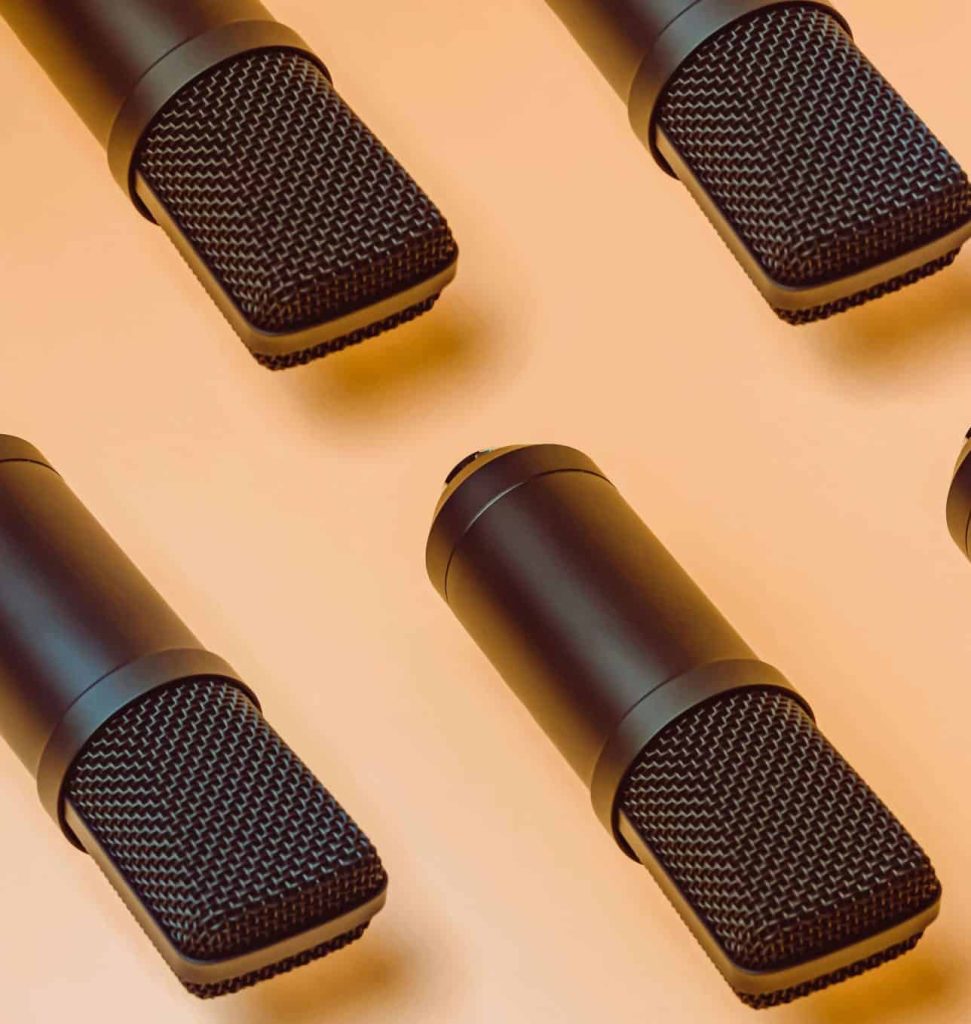1. Shure SM7B
Type: Dynamic Microphone
Price Range: $400 – $450
Key Features:
- Cardioid Polar Pattern: Captures sound primarily from the front, minimizing background noise.
- Exceptional Noise Rejection: Ideal for recording in noisy environments.
- Built-in Pop Filter: Reduces plosive sounds during speech or singing.
Pros:
- Warm and Clear Sound: Provides a natural and rich vocal tone.
- Durable Build: Robust construction ensures longevity.
- Versatile Applications: Suitable for podcasting, broadcasting, and studio recording.
Cons:
- Requires High Gain: Needs a preamp with substantial gain, which can add to the cost.
- Limited Accessories: Does not come with a shock mount or stand.
Ideal For: Podcasters, broadcasters, and vocalists seeking a warm, natural sound.
2. Audio-Technica AT2020
Type: Condenser Microphone
Price Range: $100 – $150
Key Features:
- Wide Frequency Response: Captures a broad range of vocal and instrumental sounds.
- Cardioid Polar Pattern: Focuses on the sound source, reducing ambient noise.
- Affordable Entry-Level Option: Provides quality sound reproduction at a budget-friendly price.
Pros:
- Clear and Natural Sound: Delivers accurate audio capture suitable for various recording needs.
- Easy to Use: Simple setup with standard XLR connectivity.
- Compact Design: Lightweight and portable for mobile recording.
Cons:
- Requires Phantom Power: Needs an external power source, such as an audio interface.
- No Built-in Pop Filter: Additional accessories are necessary to reduce plosives.
Ideal For: Beginners in studio recording, podcasters, and those needing a reliable microphone for voiceovers.
3. Rode NT1-A
Type: Condenser Microphone
Price Range: $230 – $270
Key Features:
- Ultra-Low Self-Noise: One of the quietest microphones available, with a self-noise level of just 5dBA.
- Wide Dynamic Range: Capable of handling both very soft and very loud sounds without distortion.
- Cardioid Pickup Pattern: Ideal for solo vocal recordings, focusing on the subject while minimizing background noise.
Pros:
- Exceptional Sound Quality: Provides clear, detailed, and natural sound reproduction.
- Sturdy Construction: Built to last with a durable metal body.
- Includes Shock Mount and Pop Filter: Comes with essential accessories for studio recording.
Cons:
- Sensitive to Ambient Noise: Its high sensitivity means it can pick up unintended sounds if not used in a controlled environment.
- Requires Phantom Power: Needs to be powered by an external source, such as an audio interface or mixer.
Ideal For: Studio vocalists, podcasters, and anyone seeking high-fidelity sound capture in a controlled setting.
4. Sennheiser e935
Type: Dynamic Microphone
Price Range: $180 – $200
Key Features:
- Cardioid Polar Pattern: Effectively isolates the vocalist’s voice from other stage noises.
- Rugged Build: Designed to withstand the demands of live performances.
- Feedback-Resistant Design: Minimizes the risk of feedback, even in challenging acoustic environments.
Pros:
- Clear and Powerful Sound: Delivers a bright and assertive vocal presence.
- Reliable Performance: Consistent sound quality, even with regular use.
- No Need for Phantom Power: Operates without external power sources, simplifying setup.
Cons:
- Limited Studio Use: While excellent for live performances, it may not capture the subtle nuances required in studio recordings.
- Lacks On/Off Switch: Some users prefer a switch for added control during live sets.
Ideal For: Live vocal performances, rehearsal sessions, and situations where durability and feedback resistance are crucial.
5. Blue Yeti
Type: USB Condenser Microphone
Price Range: $120 – $150
Key Features:
- Multiple Polar Patterns: Offers cardioid, bidirectional, omnidirectional, and stereo modes for versatile recording options.
- USB Plug-and-Play: Easy to set up with no need for additional drivers or power sources.
- Onboard Controls: Features gain control, a mute button, and a headphone output for real-time monitoring.
Pros:
- User-Friendly: Ideal for beginners due to its simplicity and ease of use.
- Versatile Recording Options: Suitable for solo recordings, interviews, and conference calls.
- Good Sound Quality: Provides clear and crisp audio for non-professional applications.
Cons:
- Not Ideal for Professional Use: Lacks the precision of high-end studio microphones.
- Large Size: Takes up a lot of desk space and can be cumbersome in smaller setups.
Ideal For: Podcasters, streamers, and content creators who need a versatile, easy-to-use microphone for various recording scenarios.
Microphone Comparison: Best for Different Needs
| Microphone | Best For | Price Range | Type |
|---|---|---|---|
| Shure SM7B | Podcasting, Streaming | $400 – $450 | Dynamic |
| Audio-Technica AT2020 | Studio Recording | $100 – $150 | Condenser |
| Rode NT1-A | Studio Vocals, Instruments | $230 – $270 | Condenser |
| Sennheiser e935 | Live Performances | $180 – $200 | Dynamic |
| Blue Yeti | Podcasting, Voiceovers | $120 – $150 | USB Condenser |
Conclusion: Which Microphone is Right for You?
Choosing the right microphone depends on your specific needs and budget. If you’re a podcaster or streamer looking for a professional setup, the Shure SM7B provides unmatched sound quality. For beginners and those setting up home studios, the Audio-Technica AT2020 and Blue Yeti offer excellent quality at affordable prices. For live performers, the Sennheiser e935 ensures durability and clarity, while the Rode NT1-A is the go-to choice for high-end studio recording.
No matter what your needs are, investing in a high-quality microphone ensures that your sound will always be professional and clear.

